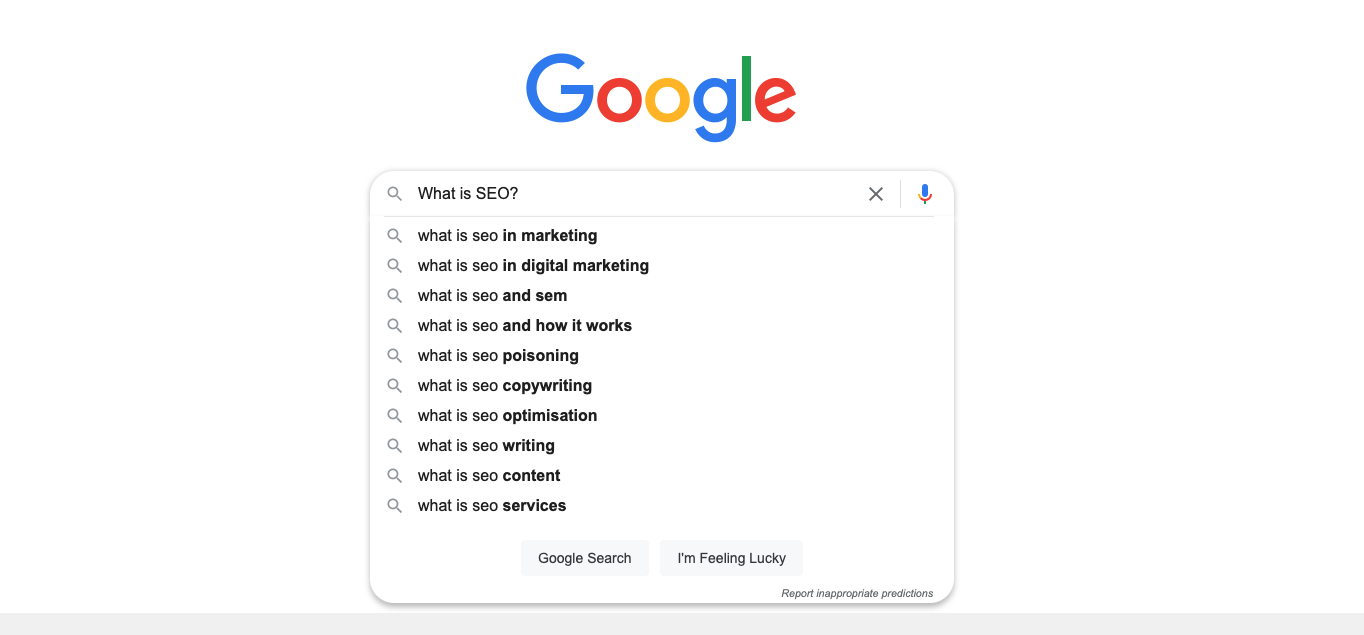SEO for Small Business: Everything you need to know

SEO for small business is a crucial element for success in the increasingly competitive online marketplace. As more consumers rely on search engines to discover and connect with products and services, it's essential for small businesses to optimize their websites and digital content for higher visibility.
By employing effective SEO strategies, small businesses can improve their search engine rankings, reach their target audience more efficiently, and ultimately drive growth.
This article will explore the importance of SEO for small businesses and provide actionable tips for optimizing your online presence.
SEO for Small Business: Top Tips to Rank Higher on Search Engines
Before we go on, we should clearly define what we mean when speaking about SEO.
What is SEO?
The term ‘SEO’ stands for ‘Search Engine Optimisation’. Search engine optimisation is the process of improving the quantity and quality of organic traffic to your website, from search engines such as Google.
- Traffic Quality – Traffic quality is critical. You need to ensure you are attracting consumers who are solely interested in your specific product or service.
- Traffic Quantity – When the right consumer is clicking through to your website, you then need that traffic to increase. The more click throughs to your website, increases the opportunity to convert these to profit.
- Organic Results – Organic results are the best results, as these are the results you do not pay for. When SEO is working well, organic (free) results increase and your reliance on paid campaigns can recede depending on your strategy.

Do I really need SEO?
If your business has a website, and you want customers, then the answer is a definitive yes! If you wish to increase traffic to your website and increase digital visibility, SEO is a must!
If you imagine all visitors to websites are a giant cake, 50% of that cake (traffic) comes from consumers discovering that website organically through a search engine.
Think about how you use the internet when buying products, where is the very first place you start? 9 times out of 10 you will start with a search engine, and rely on this for your direction. So keeping that in mind, doesn't it make sense to optimise your website to rank better on the search engine results page?
SEO provides your business with a sustainable and adaptable marketing tool, always working for your business, even when you're asleep!
How does SEO help small business?
The benefits of SEO for small business owners are endless!
When SEO is working well, your ranking on search engines vastly improves.
When this occurs, your business becomes more visible in searches and your brand awareness increases in scope and credibility.
Users are more likely to travel to your site over your competitors, who are further down the search engine results page (SERP).
SEO can help small business owners.
- Increase visibility of their site
- Increase customer experiencImprove website usability
- Decrease bounce rates
- Increase time on site
- Increase sales
- Improve rankings
- Increase conversion rates
- Build brand awareness
- Get ahead of their competition
Can SEO work for my industry?
With so many businesses out there vying for attention from the consumer, how will your business stand out? There's very few industries that can be completely excluded from SEO strategies, in fact, often, it's more of a flaw in the strategy, budget or website, than anything else.
Although it can be intimidating trying to compete with larger organisations who are already involved in the sea of SEO, it is highly advantageous for all businesses and there are many strategies that can see your business join the playing field.
SEO can attract new customers when they are searching online for a product or service like yours if your SEO is working well. It can also help you to analyse your service offerings and make future business decisions, as it can show you what your audience is really after.
You might be surprised to discover which industries do exceptionally well through SEO, and perhaps consider that if you're not getting a lot of traffic at the moment, it could be due to your website's performance, not the industry as a whole.

Can I do it myself?
Yes, you certainly can, however SEO needs consistent and ongoing maintenance with some technical prowess, which can be time consuming.
Done correctly, SEO is an undeniably brilliant investment for small businesses, helping them to grow and prosper, however, when done incorrectly, you could be penalised by Google or other search engines for improper SEO tactics.
Things like keyword stuffing, poor quality content, or spammy backlinks can get you in a lot of trouble with Google, resulting in lowered performance on the results page.
If you're into a little bit of digital tech and consumer behaviour, and you have the time, absolutely, you can do your own SEO for your website. That said, learning the ropes of SEO marketing can be challenging and technical, and not everyone has the desire (or the time), to use their own website as a guinea pig for testing.
Engaging a professional digital marketing agency can take the stress out of this process. An experienced professional can tailor an SEO marketing strategy to suit your goals, budget and product.
We just so happen to know some awesome people who can help you out! (Spoiler alert: It's us!)
Don't be fooled, SEO is not a set and forget strategy!
Time and money needs to be invested in SEO to obtain a good ROI.
If you're up for the challenge and have some time up your sleeve, you can definitely give DIY SEO a red hot go. If, however, you want solid results without the hassle, it's time to call in the professionals.
Is it just keywords?
Absolutely not.
Feel free to sprinkle keywords all through your website content but there's a lot more to it than that!
Keywords are very important of course, but SEO is a fine balance of many different factors which ensures your website will rank high on search engines.
These factors include a combination of:
- Navigation
- Conversion
- Session times
- Content
- Off page
- Outreach
- Backlinking
- Google EAT
- Keywords
- Site Security
- Quality and reliability
- Website usability
And search algorithms are changing all the time! There's so many different strategies around keywords and getting traffic to your website is only one part of it.
Unfortunately, some business owners and even some more inexperienced "SEO professionals" rely heavily on driving traffic, not considering the quality of the traffic and the user experience provided by the website.
If these things are poor, you can bet that traffic isn't hanging around, so the volume is actually doing your website more harm than good.
It's safe to say 100 high quality users with intent to buy will be more valuable to your business than 10,000 aimless users wandering by.
The same goes for the user experience, it's all well and good to attract 100,000 visitors to a website, but if it's not functioning well or is difficult to navigate, you may as well have handed them to your competitors yourself.

What is Google Analytics?
Google Analytics is a web analytics platform which analyses and reports on website traffic and data through Google.
This platform is offered through the Google business suite. It allows you to analyse the performance of your marketing, website traffic, conversions, content, products, services and much more.
Google Analytics tracks the users of your website, producing usable data about your consumer including, age, gender, purchasing behaviour, time of purchase and interests.
This is invaluable data for all small businesses and we encourage you to set up your Google Analytics if you haven't already.
Even if you don't know how to use it or what you're doing, set it up now so it can monitor your website and down the track, whether you learn or hire an agency to do it for you, it will provide data that will inform your marketing strategy.
You can't build an effective marketing strategy through guess-work and assumptions. Google Analytics provides metrics to measure performance and shows us what we're succeeding at, and what we need to improve.
If you need a hand with setting up your Google Analytics or want to talk about measuring performance, we're real nerds when it comes to metrics.
What are backlinks and how do they work?
Backlinks are links on other websites which link back to your content.
The more backlinks you have from other websites, the more Google will trust your site, with a few conditions of course!
Ensure you look for quality over quantity here, as one backlink from a trusted and reputable organisation will heavily increase your rankings far quicker than multiple blog links from an unknown website.
Remember, DON’T fall into the trap of cutting corners and purchasing backlinks. This does not work, and if Google discovers this, your rankings will fall considerably. You will then need to delete these backlinks and request that Google reanalyse your site.
You'll also need to consider the domain authority and relevance of the website who is linking back to you, but this can also be a bit of a rabbit hole once you get going.
Instead, focus on great content and run a link building campaign, reaching out to reputable bloggers and like-minded organisations.
The algorithm is really designed with the user journey in mind, so think about how they might travel to your website in a way that is helpful and relevant to their goals.
If you sell umbrellas, maybe talk to a gumboot website about teaming up.
If you're a restaurant or cafe, reach out to local guides or review websites to get listed.
If you offer a service, maybe look at local directories or providing interviews and advice to relevant articles/websites.
Back-linking is a very strategic and valuable activity when done correctly, so give it some time and thought before you ctrl+v your website all over the internet!
How much will SEO cost me?
It depends, and it depends on a few things, including, your industry, how competitive your keywords are, where your website is at and what your goals are.
Targeting one keyword is going to take less time than targeting 20 but it's more about the strategy and making sure you get traffic that converts, otherwise it's essentially pointless.
You can expect to pay anywhere between $1000 to $10,000 and sometimes more for larger organisations, anything less than $1000 could be a compromise on quality depending on your business.
Poor quality produces poor results, and in rare cases we recommend businesses don't do SEO at all if they can't put an adequate budget towards it. You're better off spending that money on something else than burning it on a campaign that won't work for you.
In most cases, we find pushing the budget up slightly can deliver much better results long term. One of our favourite outcomes of this is seeing clients who were initially worried about their budget, call us down the track to double it, as the results have provided them the revenue to do so.

What is the ROI of SEO?
For this, you need to ask yourself, what would ranking number 1 in a consumer search be worth to you?
If that's a little abstract, consider how many more leads per week would you need to fulfil your business goals.
Good SEO offers impressive ROI and conversions rates on your website. To get good ROI, you need to be visible, and SEO creates and increases visibility.
To calculate the ROI for SEO, yes, it is about investment versus profit, however we need to think also about brand awareness and visibility and how these play a part also.
To perhaps over simplify, if you sell a product or provide a service for $1000 and you're currently seeing 10 sales a month, you have yourself $10,000.
Now if you're able to spend $1000 a month and get an additional 5 sales per month, you're already looking at increase of revenue of 50% ($5000), bringing your monthly takings up to $15,000. And this is a very rudimentary example.
Now as we said, your ROI depends on a few factors, industry, competition, budget etc. But the bottom line is that there should be a clear return of investment from any marketing that you do.
Depending on your business goals, between 5% and 10% of your gross revenue should be going towards marketing your business.
Prior to COVID19, it was recommended that Australian small businesses then split that budget 50/50 between digital and real world advertising, however, we think it's safe to say that you should be leaning much further into digital in this day and age.

How long does it take to work?
Again, it depends, but don't expect miracles overnight from SEO. It will take anywhere from 1-3 months you start seeing results. Although we would recommend waiting 3 months minimum for any tangible, meaningful results.
At first, you need to do your research, implement the identified changes and then wait for the algorithm to catch up. From there you can monitor and optimise according to the performance as you go, but there's a bit of to and fro as SEO activities are implemented and search engines index pages and monitor performance.
With this in mind, SEO offers 24/7 marketing promotion and is always working in the background fighting for your product or service to be seen first.
SEO is a long-term digital marketing strategy. Unlike other marketing strategies, such as pay per click (PPC), SEO does not deliver results in 24 hours, SEO takes time and tweaking to produce results.
We think of it as farming. We plant seeds, we water them, give them great soil to grow, protect them from the wind and sing to them (you don't sing to your plants?). Then in a few months time, we benefit from the crops we lovingly tended to.
Plant seeds now. Feast later.
Should I get SEO?
When done properly, SEO is a fantastic marketing strategy for most businesses.
That said, not every strategy will work for every industry or business. If you are unsure about SEO, contact us today to discuss your website and SEO potential.
We can help tailor an SEO strategy to suit your business and budget, providing an effective way to meet your goals and grow your business.
Learn more about SEO for Small Business by contacting us here
A content marketing provider with a relationship approach.
Chat with us if you are looking to gain more from your online marketing.
We're Content Marketers based right here in Melbourne, VIC. If you need help with your SEO charged content, we can help you.
© Goodness Greatness. All rights reserved.














